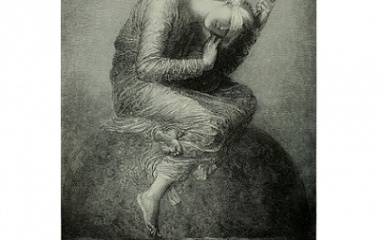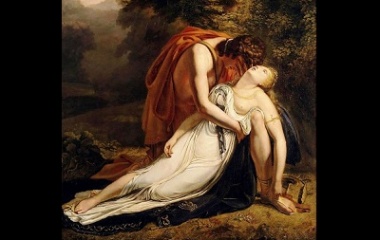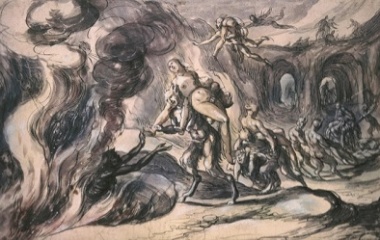- Pronunciation: yew-RI-di-see
- Origin: Greek
- Role: Nymph
- Symbols: Serpent
- Children: None
- Other Names: Eurdice, Erudice
Who Is Eurydice?
One of the greatest Greek love stories ever told focuses on Eurydice and Orpheus. Eurydice was a shy but beautiful woman who captured Orpheus’ attention and heart. Their story tells of a truly tragic romance and serves as a reminder of how powerful love can be.
Origins
Eurydice was a Greek nymph. She married Orpheus, a legendary poet and musician. She died tragically young, and her lover literally went to the end of the world and back again to try and save her. Fate would have the final word, though.
Legends and Stories
Eurydice and Orpheus are the Greek versions of Romeo and Juliet. Without the other, their sole existence seems incomplete.
The Meeting
Orpheus spent most of his childhood exploring and pursuing music and poetry. It became obvious very quickly that his talent was going to take him far. He could enchant any crowd, whether human or beast. In fact, he could even enchant inanimate objects.
He often entertained crowds with his lyre and melodious voice. During one of these sessions, he spotted the most beautiful girl he had ever seen. She was immediately drawn to him because of his infectious voice, and the two could not break their stares. They fell deeply in love and were unable to separate for even a moment. They soon wed. Their marriage was blessed by the god of marriage, Hymenaios, and the day began with sunshine that shone down on the happy festivities. But as the day progressed, shadows loomed in the distance, seeming to foreshadow what the future held for the new couple.
Fate Bites
Unfortunately, fate had different plans for Eurydice and Orpheus. Because of her great beauty, it wasn’t uncommon for other men to find Eurydice attractive and yearn for her. One of these men, Aristaeus, came up with a plan to make Eurydice his. He despised Orpheus and was very determined. One day, he hid in the bushes and waited for the newlyweds to walk by. He planned to jump out from his hiding spot as they passed, and to kill Orpheus. But Orpheus detected him and his plan, so he grabbed Eurydice by the hand and they began to run through the forest, trying to escape their enemy.
But Aristaeus was strong and swift and was able to keep up with the couple. Just as he was gaining ground, Eurydice suddenly stumbled and fell. Her hand slipped out of Opheus’ and it took him a moment to stop and turn around to go back for her. He couldn’t understand why she wouldn’t respond to him as he knelt by her side. He looked around for Aristaeus, but he had already left after witnessing what had happened to Eurydice. She had stepped on a nest of snakes and had been bitten by a venomous viper. She had quickly passed and, without warning, Orpheus found himself to be a widower.
Orpheus’ Plan
Orpheus wasn’t the same after Eurydice’s death. While he had once been free-spirited and lively, he was now without a purpose. He grieved for his wife from the moment he woke up until he retired at the end of each day. Through his grief, he was able to come up with a plan to get his wife back. It was a crazy idea but he had no choice. He was nothing without Eurydice.
He planned on going to the Underworld and speaking to Hades, the god who ran the world that accepted the souls of the deceased. He asked his father, Apollo, to speak to Hades and warn him of his imminent arrival.
Orpheus brought his lyre and used his music and voice to gain access to the Underworld. He told Hades and the other rulers why he was there. He played the lyre and sang a song to King Hades and Queen Persephone. The pain in his voice was obvious and the song was beautiful and captivating, just like Eurydice. Hades wept and his wife’s heart melted. Orpheus’ voice was so inspiring that Hades felt he had no choice but to return Eurydice to her husband.
But there was a catch. Hades warned Orpheus that he was not to look back at his wife while they were journeying back to the Upper World. He was to walk in front of her and remain faithful that she was there, only looking back once they had entered the light.
Orpheus agreed and was thrilled that his plan had worked. He began the journey back to the Upper World with a smile on his face. He couldn’t wait to reach the light and see his wife again. The journey was long though, and his mind began to give his heart doubt. As he was approaching the light, he thought that he couldn’t wait any longer. Just as the sun hit him, he turned to see his wife. But because she was behind him and still in the shadows of the Underworld, she was pulled back into the land of the dead. Orpheus fell to the ground in despair. He tried to enter the Underworld again but he was denied entry.
Orpheus spent the rest of his days disoriented, wandering in despair. Nothing nor no one could console him. He was tormented by his memories and no longer possessed the musical talents that he once did. He shunned all women from his life, which eventually led to his demise. One day, as Orpheus lay on top of a rock, staring up into the skies, a group of women attacked him. He did not fight them off, even as they cut his body apart and eventually threw him into the river with his lyre. The myth says that his head and lyre eventually floated to the island of Lesvos, where Muses found them and executed a proper burial for the widower. It was said that his grave emanated music when his soul was finally reunited with Eurydice in Hades.
Family
Eurydice was an oak nymph known for her beauty. She was married to Orpheus, known for his love of music, but their marriage was too short to result in any children.
Appearance
It is said that Eurydice was strikingly beautiful and attracted many suitors. She was a faithful wife though, which ultimately led to her death. In artistic representations of Eurydice, she is either shown immediately following her encounter with the snake bite or on her journey out of the underworld. No matter the situation she’s shown in, she is typically shown in flowing clothing with either long, loose, wavy hair or hair pinned up in a traditional Greek style.
Symbology
Eurydice is often shown with her husband as neither of their myths can exist without the other. She is also associated with snakes and the Underworld. But many Greek mythology enthusiasts would argue that the symbol that most accurately represents her is her beauty.










